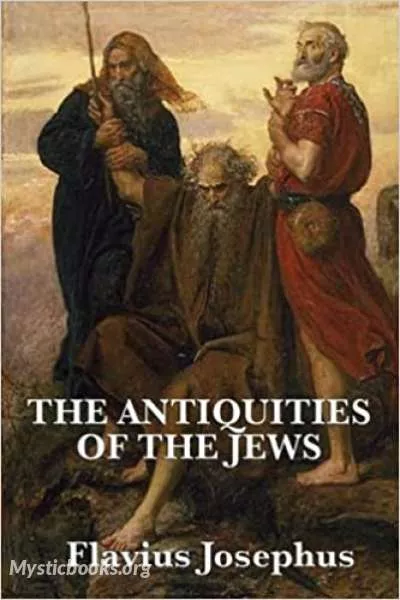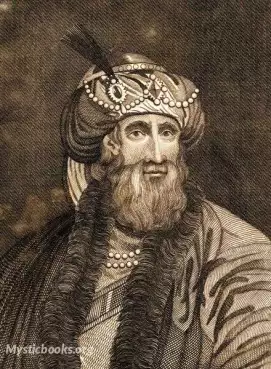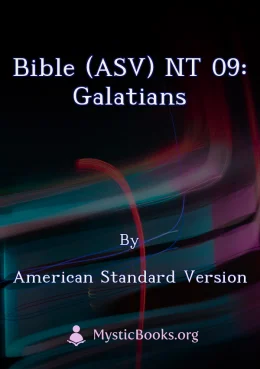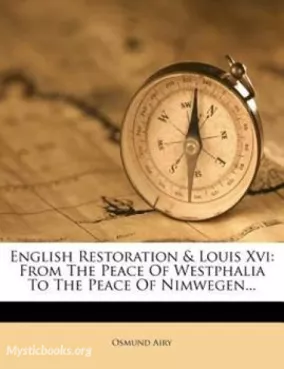
The Antiquities of the Jews, Volume 4
'The Antiquities of the Jews, Volume 4' Summary
Josephus' Judean Antiquities is a vital source for the history of the Intertestamental period and the Jewish war against Rome.
In the preface of Antiquities of the Jews, Josephus provides his motivation for composing such a large work. He writes:
Now I have undertaken the present work, as thinking it will appear to all the Greeks worthy of their study; for it will contain all our antiquities, and the constitution of our government, as interpreted out of the Hebrew Scriptures.
Josephan scholar Louis Feldman highlights several of the misconceptions about the Jewish people that were being circulated in Josephus' time. In particular, the Jews were thought to lack great historical figures and a credible history of their people. They were also accused of harboring hostility toward non-Jews, and were thought to be generally lacking in loyalty, respect for authority, and charity. With these harsh accusations against the Jews fluttering about the Roman empire, Josephus, formerly Joseph ben Matthias, set out to provide a Hellenized version of the Jewish history. Such a work is often called an "apologia," as it pleads the case of a group of people or set of beliefs to a larger audience.
In order to accomplish this goal, Josephus omitted certain accounts in the Jewish narrative and even added a Hellenistic "glaze" to his work. For example, the "Song of The Sea" sung by Moses and the people of Israel after their deliverance at the Red Sea is completely omitted in Josephus' text. He does mention, however, that Moses composed a song to God in hexameter—a rather unusual (and Greek) metrical scheme for an ancient Hebrew. Josephus also writes that Abraham taught science to the Egyptians, who in turn taught the Greeks, and that Moses set up a senatorial priestly aristocracy, which like Rome resisted monarchy. Thus, in an attempt to make the Jewish history more palatable to his Greco-Roman audience, the great figures of the biblical stories are presented as ideal philosopher-leaders.
In another example, apparently due to his concern with pagan antisemitism, Josephus omitted the entire episode of the golden calf from his account of the Israelites at Mount Sinai. It has been suggested that he was afraid that the biblical account might be employed by Alexandrian antisemites to lend credence to their allegation that the Jews worshiped an ass's head in the Temple (cf. Apion 2:80, 114, 120; Tacitus, Histories 5:4). He also made discredited allegations that the Ancient Egyptians forced the Jewish slaves to build the pyramids, writing “They [the Egyptian taskmasters] set them also to build pyramids.”.
Josephus also adds a short account of his personal life, Vita, as an appendix to the Judean Antiquities.
Antiquities of the Jews contains a good deal of valuable, sometimes unique, historical material. This applies, for example, to the history of the Hellenistic states, Parthia, Armenia, the Nabatean kingdom. Roman power, to the history of Rome's conquest of the states of Western Asia. It is no accident that in the Middle Ages and in modern times this book of Josephus was considered one of the most important sources in ancient Roman history, along with the works of Titus Livius, Tacitus, Suetonius, and one of the most erudite Christian authors of the 4th–5th centuries, Jerome called Josephus Flavius "Titus Livius of the Greeks".
The extant copies of this work, which all derive from Christian sources, contain two disputed passages about Jesus. The long one has come to be known as the Testimonium Flavianum. If genuine, it is an early extrabiblical record of Jesus, and as such is sometimes cited as independent evidence for the historical existence of Jesus.
Book Details
Language
EnglishOriginal Language
EnglishPublished In
1544Genre/Category
Tags/Keywords
Authors

Flavius Josephus
Italy
Titus Flavius Josephus was a first-century Romano-Jewish historian who was born in Jerusalem—then part of Roman Judea—to a father of priestly descent and a mother who claimed royal ancestr...
Books by Flavius JosephusDownload eBooks
Listen/Download Audiobook
- Select Speed
Related books

Bible (ASV) NT 09: Galatians by American Standard Version
The Epistle to the Galatians is a book of the New Testament. It is a letter from Paul of Tarsus to a number of early Christian communities in the Roma...

The Lives of the Queens of England, Volume 9 by Agnes Strickland
In the darkest corners of royal history, secrets lie hidden beneath the gilded crowns and majestic thrones. Step into the enchanting world of queens a...

War and Peace, Volume 1 (Maude translation) by Leo Tolstoy
War and Peace is an epic novel by Leo Tolstoy, first published in 1869. It is one of the longest and most acclaimed works of literature ever written,...

The Chronicles of America Volume 12 - Washington and his Comrades in Arms by George Wrong
Embark on a captivating journey into the heart of the American Revolution, as "Washington and his Comrades in Arms," Volume 12 of "The Chronicles of A...

Golden Bough. A Study in Magic and Religion. Part 3. The Dying God by James Frazer
The third part of James Frazer's monumental "The Golden Bough" explores the practice of human sacrifice and the mortality of gods in various cultures....

The Great Events by Famous Historians, Volume 01 by Charles F. Horne
Delve into the annals of history and witness the unfolding of momentous events that shaped civilizations and societies in "The Great Events by Famous...

The Lives of the Queens of England Volume 4 by Agnes Strickland
Step into the captivating world of royal intrigue and feminine power as Agnes Strickland and Elisabeth Strickland delve into the extraordinary lives o...

Democracy in America Vol. I by Alexis de Tocqueville
When Tocqueville visited America in the 1830s he found a thriving democracy of a kind he had not seen anywhere else. Many of his insightful observatio...

Fifty Years Ago by Walter Besant
Fifty Years Ago by Walter Besant is a historical memoir that presents a picture of life, manners, and society in Great Britain during the mid-19th cen...

The English Restoration and Louis XIV: From the Peace of Westphalia to the Peace of Nimwegen by Osmund Airy
How did the English Restoration and the reign of Louis XIV reshape Europe? The English Restoration and Louis XIV: From the Peace of Westphalia to the...
Reviews for The Antiquities of the Jews, Volume 4
No reviews posted or approved, yet...